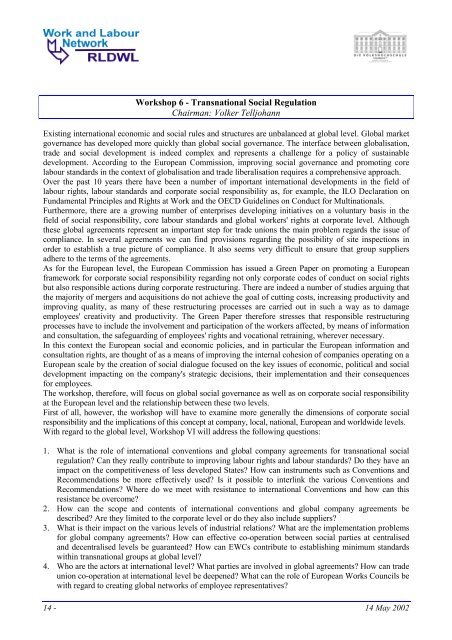"Labour, Globalisation and The New Economy" - rldwl
"Labour, Globalisation and The New Economy" - rldwl
"Labour, Globalisation and The New Economy" - rldwl
Create successful ePaper yourself
Turn your PDF publications into a flip-book with our unique Google optimized e-Paper software.
Workshop 6 - Transnational Social Regulation<br />
Chairman: Volker Telljohann<br />
Existing international economic <strong>and</strong> social rules <strong>and</strong> structures are unbalanced at global level. Global market<br />
governance has developed more quickly than global social governance. <strong>The</strong> interface between globalisation,<br />
trade <strong>and</strong> social development is indeed complex <strong>and</strong> represents a challenge for a policy of sustainable<br />
development. According to the European Commission, improving social governance <strong>and</strong> promoting core<br />
labour st<strong>and</strong>ards in the context of globalisation <strong>and</strong> trade liberalisation requires a comprehensive approach.<br />
Over the past 10 years there have been a number of important international developments in the field of<br />
labour rights, labour st<strong>and</strong>ards <strong>and</strong> corporate social responsibility as, for example, the ILO Declaration on<br />
Fundamental Principles <strong>and</strong> Rights at Work <strong>and</strong> the OECD Guidelines on Conduct for Multinationals.<br />
Furthermore, there are a growing number of enterprises developing initiatives on a voluntary basis in the<br />
field of social responsibility, core labour st<strong>and</strong>ards <strong>and</strong> global workers' rights at corporate level. Although<br />
these global agreements represent an important step for trade unions the main problem regards the issue of<br />
compliance. In several agreements we can find provisions regarding the possibility of site inspections in<br />
order to establish a true picture of compliance. It also seems very difficult to ensure that group suppliers<br />
adhere to the terms of the agreements.<br />
As for the European level, the European Commission has issued a Green Paper on promoting a European<br />
framework for corporate social responsibility regarding not only corporate codes of conduct on social rights<br />
but also responsible actions during corporate restructuring. <strong>The</strong>re are indeed a number of studies arguing that<br />
the majority of mergers <strong>and</strong> acquisitions do not achieve the goal of cutting costs, increasing productivity <strong>and</strong><br />
improving quality, as many of these restructuring processes are carried out in such a way as to damage<br />
employees' creativity <strong>and</strong> productivity. <strong>The</strong> Green Paper therefore stresses that responsible restructuring<br />
processes have to include the involvement <strong>and</strong> participation of the workers affected, by means of information<br />
<strong>and</strong> consultation, the safeguarding of employees' rights <strong>and</strong> vocational retraining, wherever necessary.<br />
In this context the European social <strong>and</strong> economic policies, <strong>and</strong> in particular the European information <strong>and</strong><br />
consultation rights, are thought of as a means of improving the internal cohesion of companies operating on a<br />
European scale by the creation of social dialogue focused on the key issues of economic, political <strong>and</strong> social<br />
development impacting on the company's strategic decisions, their implementation <strong>and</strong> their consequences<br />
for employees.<br />
<strong>The</strong> workshop, therefore, will focus on global social governance as well as on corporate social responsibility<br />
at the European level <strong>and</strong> the relationship between these two levels.<br />
First of all, however, the workshop will have to examine more generally the dimensions of corporate social<br />
responsibility <strong>and</strong> the implications of this concept at company, local, national, European <strong>and</strong> worldwide levels.<br />
With regard to the global level, Workshop VI will address the following questions:<br />
1. What is the role of international conventions <strong>and</strong> global company agreements for transnational social<br />
regulation? Can they really contribute to improving labour rights <strong>and</strong> labour st<strong>and</strong>ards? Do they have an<br />
impact on the competitiveness of less developed States? How can instruments such as Conventions <strong>and</strong><br />
Recommendations be more effectively used? Is it possible to interlink the various Conventions <strong>and</strong><br />
Recommendations? Where do we meet with resistance to international Conventions <strong>and</strong> how can this<br />
resistance be overcome?<br />
2. How can the scope <strong>and</strong> contents of international conventions <strong>and</strong> global company agreements be<br />
described? Are they limited to the corporate level or do they also include suppliers?<br />
3. What is their impact on the various levels of industrial relations? What are the implementation problems<br />
for global company agreements? How can effective co-operation between social parties at centralised<br />
<strong>and</strong> decentralised levels be guaranteed? How can EWCs contribute to establishing minimum st<strong>and</strong>ards<br />
within transnational groups at global level?<br />
4. Who are the actors at international level? What parties are involved in global agreements? How can trade<br />
union co-operation at international level be deepened? What can the role of European Works Councils be<br />
with regard to creating global networks of employee representatives?<br />
14 - 14 May 2002


